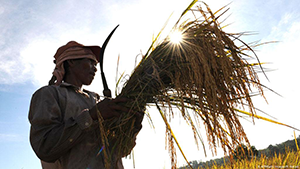The Friends of the Filipino People in Struggle (FFPS) held its recent webinar, “Land is Life!”, on October 11, highlighting the continuing plight and resistance of Filipino peasants amid widespread landlessness, state repression, and economic hardship.
A discussion paper presented at the event provided an overview of the general situation of the Filipino peasantry and the perspective of the revolutionary peasant organization Pambansang Katipunan ng Magbubukid (PKM). The presentation, while avoiding tactical details due to security concerns, offered a comprehensive analysis of current conditions in the countryside and the peasants’ role as a primary force in the people’s democratic movement.
According to the discussion, local peasant chapters remain active and determined despite intensified militarization, forced evacuations, and aerial bombings in rural areas. Despite heavy counter-insurgency operations, many communities have begun rebuilding their mass organizations, reaffirming their commitment to the struggle for land and livelihood.
The paper emphasized that the roots of rural poverty and unrest lie in the persistence of the semi-feudal and semi-colonial system. It cited data showing that only a small fraction of the agricultural population truly owns the land they till, despite decades of so-called “land reform” programs. From Marcos’ Presidential Decree 27 to the current National Agrarian Emancipation Act under President Marcos Jr., these initiatives were described as “sham reforms” that failed to end land monopoly and exploitation.
Severe poverty remains widespread among the rural population. The PKM cited that in 2023, the average daily family income of P968 falls well below the P1,186 living wage, with many regions averaging only P647 per day. The PKM attributed these hardships to landlessness, low wages, usurious lending practices, and depressed farm-gate prices controlled by landlords and traders.
Despite these conditions, the presentation underscored signs of resurgence among revolutionary peasant communities. Organizers reported growth in membership, expansion of peasant advocacy networks, and strengthening of anti-feudal and anti-militarization campaigns. Efforts to build human rights committees, provide sanctuary for persecuted leaders, and coordinate solidarity missions have also been noted as key defensive measures.
The webinar concluded with a message of optimism and determination. Peasant leaders reaffirmed their call for genuine agrarian reform and unity among all democratic sectors in defending the right to land and life.
“The peasant masses remain steadfast,” the statement declared. “They are ready to be aroused, organized, and mobilized for genuine change. Land to the landless—onward to the people’s democratic revolution!”
